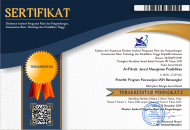MANAJEMEN KELAS DALAM MENCIPTAKAN SUASANA BELAJAR YANG KONDUSIF; UPAYA PENINGKATAN PRESTASI BELAJAR SISWA
Abstract
Keywords
References
Baharun, H. (2006). Manajemen Strategi Peningkatan Mutu Pendidikan Pondok Pesantren (Studi di Pondok Pesantren Nurul Jadid Paiton Probolinggo). Tesis, konsentrasi Manajemen Pendidikan Islam, Program Pascasarjana, Universitas Islam Negeri.
Baharun, H. (2012). Desentralisasi Dan Implikasinya Terhadap Pengembangan Sistem Pendidikan Islam. Jurnal At-Tajdid, 1(2).
Baharun, H. (2017). Pengembangan Kurikulum : Teori dan Praktik (Konsep, Prinsip, Model, Pendekatan dan Langkah-langkah Pengembangan Kurikulum PAI). Yogyakarta: Cantrik Pustaka.
Baharun, H. (2017). Peningkatan Kompetensi Guru melalui Sistem Kepemimpinan Kepala Madrasah. At-Tajdid: Jurnal Ilmu Tarbiyah, 6 (1), 1–25.
Slavin, Robert E. (2009). Psikologi Pendidikan. Teori dan Praktek. Edisi Kedelapan. Pearson., Jakarta: Indeks.
Brooks, J. G., & Brooks, M. G. (1993). In search of understanding: The case for constructivist classrooms. Alexandria, VA: Association of Supervision and Curriculum Development.
Seifert, Kelvin & Sutton, Rosemary, (2009). Global Text, Educational Psychology Second Edition,Jacobs Foundation, Zurich, Switzerland.
Santrock, John .W. (2014). Psikologi Pendidikan, Educational Psycology. Edisi 5-Buku 2, McGraw-Hill Education, Jakarta: Salemba Humanika.
Nissim Yonit, Weissblueth Eyal, Scott-Webber , Lennie & Amar Shimon. 2016.The Effect of a Stimulating Learning Environment on Pre-Service Teachers’ Motivation and 21st Century Skills,Canadian Center of Science and Education,Journal of Education and Learning; Vol. 5, No. 3; 2016
Carnell E & Lodge C (2002), Supporting Effective Learning, London: Paul Chapman.
Degeng, INS. 1998. Mencari Paradigma Baru Masalah Belajar dari Keteraturan Kesemerautan. Pidato pengukuhan Guru Besar IKIP Malang.
Degeng, N. S. 2006a. Teori Pembelajaran 2: Terapan. Malang: Universitas Terbuka.
Charles, C.M. & Senter, W. Gail. (1995). Elementary Classroom Management, Second
Huang, Ronghuai. Yang, Junfeng. Zheng, Lanqin, 2013.The Components and Functions of Smart Learning Environments forEasy, Engaged and Effective Learning.International Journal for Educational Media and Technology,. Vol.7, No. 1, pp. 4-14,ISSN 1882–1693.
Walters, Jim & Frei, Shelly. Edt. Kessler. (2007). Managing Classroom Behavior and Discipline, USA: Corrine Burton, MAEd.
Muali, C. (2016). Konstruksi Strategi Pembelajaran Berbasis Multiple Intelligenecs Sebagai Upaya Pemecahan Masalah Belajar. Pedagogik; Jurnal Pendidikan, 3 (2), 1–11.
Peter Salim. (2002). The Contemporary English-Indonesia Dictonary. Jakarta: Modern English Press.
Charles, C.M. & Senter, W. Gail. (1995). Elementary Classroom Management, Second Edition. New York; Longman Publisher USA.
Degeng, INS (2013). Ilmu Pembelajaran: Klasifikasi Variabel Untuk Pengembangan Teori dan Penelitian, Bandung: Aras Media.
DOI: http://dx.doi.org/10.31958/jaf.v5i2.1106
Refbacks
- There are currently no refbacks.
Copyright (c) 2018 1Abdul Hamid Wahid, Chusnul Muali, Mutmainnah Mutmainnah

This work is licensed under a Creative Commons Attribution-NonCommercial 4.0 International License.
__________________________________________________________________________
 | Al-Fikrah: The Journal of Educational Management |
Creations are disseminated below Lisensi Creative Commons Atribusi-NonKomersial 4.0 Internasional.













